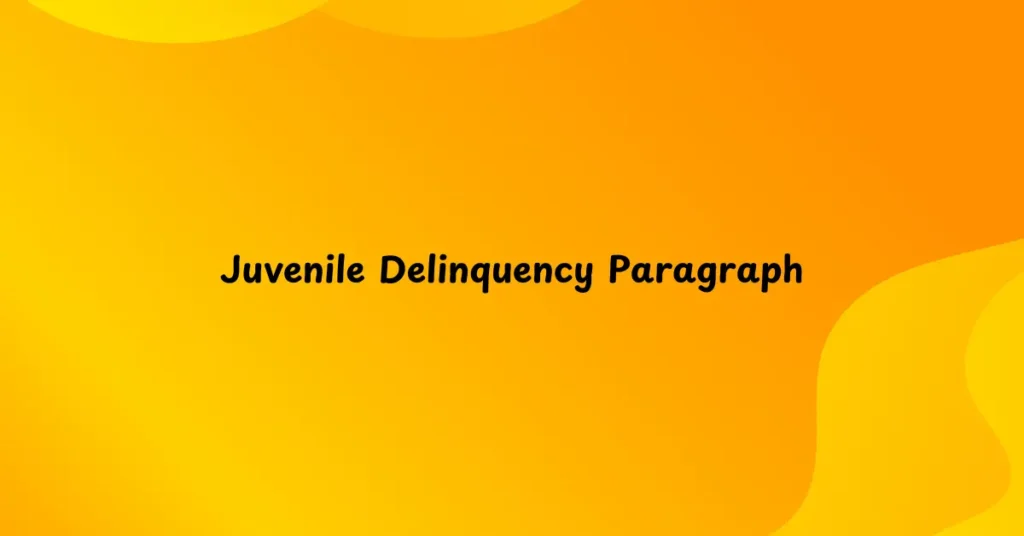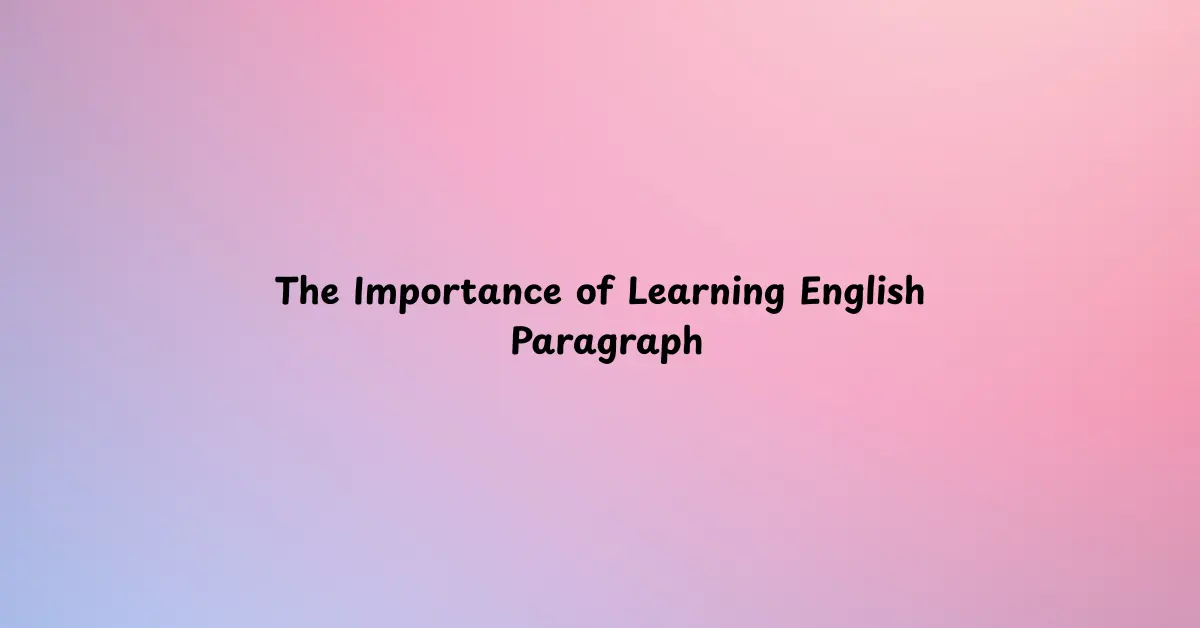Juvenile delinquency means kids under 18 doing illegal or harmful things like stealing or skipping school. It happens because of problems like family issues, peer pressure, or lack of guidance. Communities, schools, and families can prevent this by offering support, safe spaces, and positive activities. Understanding and helping kids early can keep them on the right path.
In this post, you will learn how to write a paragraph on juvenile delinquency and also see some FAQs to understand it better.
Now, let’s start today’s lesson!
Juvenile Delinquency Paragraph For HSC 300 Words
What is juvenile delinquency?
Why do children become delinquent?
How can schools affect delinquency?
How can families and communities help?
How can juvenile delinquency be prevented?
Juvenile delinquency means when children or teenagers under 18 get involved in illegal or wrong activities. It is a serious problem that affects not only the young people but also their families and communities. Many things can make a child act this way. Problems at home, like neglect, abuse, or broken families, can make children feel lonely or sad. Some children may follow bad friends or want to fit in with the wrong crowd. Poverty and lack of education also play a big role. When children do not have good schools, fun activities, or support, they may feel hopeless and make bad choices.
The place where children live is important too. Living in neighborhoods with crime or unemployment can make it easier for young people to get into trouble. Schools also matter. If a student feels left out, ignored, or struggles with studies, they may act badly.
Even though juvenile delinquency is a problem, it can be prevented. We need to understand why children make wrong choices and help them in the right way. Programs like mentoring, counseling, and support can guide children to make better decisions. Parents, teachers, and community leaders should work together to create a safe and caring environment. Children need good role models, love, guidance, and a sense of belonging.
By giving children support and care, we can help them grow into responsible adults. Reducing juvenile delinquency will make families, schools, and communities safer and happier. Every child deserves a chance to learn, play, and live in a positive environment.
Juvenile Delinquency Paragraph For SSC 250 Words
Juvenile delinquency means when children or teenagers under 18 take part in illegal or bad activities. It is a serious problem that affects not only the young people but also their families and communities. There are many reasons why young people may become involved in such behavior. These include not having proper guidance, living in broken homes, facing poverty, having bad friends, or seeing violence around them. When children do not get love and support at home, they may feel lonely and try to fit in elsewhere, sometimes making wrong choices. Schools are also important. If a student feels left out or has trouble with studies, they may act out. Communities where there is unemployment or crime can also make it easier for young people to get into trouble.
But juvenile delinquency can be prevented. We need to find out the reasons behind it and help children in the right way. Programs like mentoring, counseling, and support can guide them to make better choices. Parents, teachers, and community leaders must work together to give children a safe and caring environment. Young people need good role models, understanding, and a feeling of belonging. By providing these, we can reduce bad behavior and help build stronger, safer communities for everyone.
Juvenile Delinquency Paragraph 200 Words For Class 9 10
Juvenile delinquency means when children or teenagers under 18 take part in illegal or bad activities. It is a serious problem that affects not only young people but also their families and communities. Many things can lead a child to behave this way. Problems at home, like neglect, abuse, or broken families, can make children feel sad and lonely. Some children may follow bad friends or try to fit in with the wrong crowd. Poverty and lack of education also play a role. When children do not have good schools, activities, or support, they may make wrong choices.
The place where children live matters too. Living in areas with crime or unemployment can make it easier for children to get into trouble. Schools are important as well. If a student feels left out or struggles with studies, they may act badly.
Even though juvenile delinquency is a problem, it can be prevented. Programs like mentoring, counseling, and support can guide children to make better choices. Parents, teachers, and community leaders must work together to give children love, guidance, and good role models. By providing care and support, children can grow into responsible adults, and families, schools, and communities can become safer and happier.
Juvenile Delinquency Paragraph 150 Words For Class 6 7 8
Juvenile delinquency means when children or teenagers under 18 do wrong or illegal things. This can include stealing, breaking things, or hurting others. Many things can make young people act this way. Problems at home, not having guidance, bad friends, or living in a hard place can cause trouble. Sometimes, children act out because they feel sad or stressed.
Schools and communities can help prevent these problems. Giving children support, good role models, and fun activities can help them make better choices. Stopping juvenile delinquency is not just about punishment. It is also about understanding why children make mistakes and helping them change.
A strong support system from parents, teachers, and community members can guide children on the right path. When young people get help and care, they can grow up to be responsible and happy adults.
Juvenile Delinquency Paragraph 100 Words For Class 5
Juvenile delinquency refers to illegal or harmful behavior by children and teenagers. It can include theft, vandalism, or more serious crimes. Many factors contribute to this problem, like lack of parental guidance, poverty, or peer pressure. Sometimes, young people get involved with the wrong crowd and make poor choices. Schools and communities play an important role in preventing delinquency by offering support and positive activities. Programs that teach life skills, encourage education, and promote healthy relationships can make a big difference. Punishments alone don’t always solve the issue. Helping juveniles understand the effects of their actions and guiding them toward better decisions is key. Addressing the root causes can reduce delinquency and help youth lead better lives.
Juvenile Delinquency Paragraph For Admission Test
Juvenile delinquency refers to the involvement of children or teenagers under 18 in activities that break the law. This can include serious crimes such as theft, vandalism, or violence, as well as smaller acts like skipping school, breaking curfew, or underage drinking. Young people may behave this way for many reasons. Family problems, lack of guidance, peer pressure, and the absence of positive role models can lead children to make wrong choices. Poverty and a troubled home life are also important factors.
Schools and communities play a key role in preventing juvenile delinquency. Programs that provide mentorship, life skills training, and engaging activities can guide young people in a positive direction. The legal system focuses on helping juveniles rather than only punishing them. Rehabilitation, counseling, and skill-building are often used instead of sending children to jail.
The main goal is to address the reasons behind delinquent behavior so that young people can grow into responsible adults. By offering support, guidance, and second chances, families, schools, and communities can reduce juvenile crime. Helping children make better choices not only benefits them but also builds safer and stronger societies.
Hard To Read Words used In This Post
| Word | Meaning (অর্থ) | Explanation (ব্যাখ্যা) |
|---|---|---|
| Juvenile | অপ্রাপ্তবয়স্ক | এমন ব্যক্তি যিনি ১৮ বছরের কম বয়সী। |
| Delinquency | অপরাধমূলক আচরণ | আইন ভঙ্গ করা বা সমাজের নিয়ম ভাঙার প্রবণতা। |
| Unlawful | বেআইনি | যা আইনসঙ্গত নয় বা আইন ভঙ্গ করে। |
| Neglect | অবহেলা | কারো প্রতি যথাযথ দায়িত্ব পালন না করা বা যত্ন না নেওয়া। |
| Peer Pressure | সমবয়সীদের চাপ | বন্ধুবান্ধব বা সমবয়সীদের কারণে কিছু করার চাপ অনুভব করা। |
| Vandalism | ভাঙচুর | ইচ্ছাকৃতভাবে অন্যের সম্পত্তি ধ্বংস করা বা ক্ষতি করা। |
| Rehabilitation | পুনর্বাসন | কাউকে খারাপ পথ থেকে সঠিক পথে ফিরিয়ে আনার জন্য সাহায্য করা। |
| Counseling | পরামর্শ সেবা | ব্যক্তিগত সমস্যা বা আবেগীয় বিষয় সম্পর্কে পরামর্শ দেওয়া। |
| Mentorship | পরামর্শ প্রদান | কাউকে গাইড করা বা উন্নতির জন্য সাহায্য করা। |
| Society | সমাজ | একটি বড় গোষ্ঠী, যেখানে মানুষ একসঙ্গে বাস করে এবং নিয়ম ও সংস্কৃতি অনুসরণ করে। |
FAQs About Juvenile Delinquency
- What is juvenile delinquency?
Juvenile delinquency means when kids under 18 break the law or do harmful things.
- Who is called a juvenile?
A juvenile is a person who is younger than 18 years old.
- What kind of things count as juvenile delinquency?
It can include things like stealing, skipping school, breaking curfew, or underage drinking.
- Why do some kids do bad things?
Kids may do bad things because of family problems, peer pressure, or not having good role models.
- How can schools help stop juvenile delinquency?
Schools can help by teaching life skills, giving guidance, and creating fun and safe activities for kids.
- What does the law do to help juveniles?
Instead of punishing them, the law often helps juveniles by giving counseling, training, and second chances.
- How can we prevent juvenile delinquency?
By giving kids love, support, and safe spaces to grow, we can help them stay on the right path.
We hope you have learned how juvenile delinquency happens, why it is a problem, and how we can help kids make better choices. By understanding this topic, you can write a clear paragraph for exams and explain it easily.








